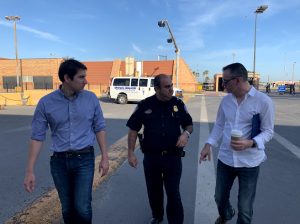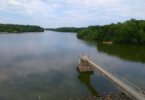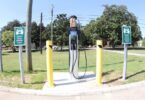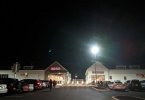
Republican Congressman Brian Fitzpatrick said the information he learned and what he observed earlier this week at federal government facilities along the U.S.-Mexico border will be brought back to Washington D.C.
The second-term congressman visited facilities and talked with federal agents and migrants in Hidalgo County, Texas, along with Congressman Josh Harder, a Democrat from California. It was the congressman’s third trip to the border as an elected official and follows time spent along the border while he was working as an FBI special agent.
The congressman from Middletown said he observed holding facilities in McAllen, Texas, and talked to members of U.S. Customs and Border Protection and U.S. Border Patrol who are tasked with dealing with migrants who enter the country.
While the holding facilities were “crowded,” Fitzpatrick said officials on the ground were doing the best they could to deal with the situation on the ground while following laws and policies.
“The law enforcement there are professional and doing the best they can,” he said, noting any law enforcement members were not acting properly should be investigated by federal officials.
In speaking with law enforcement, they explained influxes of migrants come in ebbs and flows and the impact it has on holding centers and enforcement, Fitzpatrick noted.
Fitzpatrick explained that agents and officers said they need more boots on the ground and an investment in technology. The congressman also suggested a border barrier in places where is makes sense.
A comprehensive assessment of the border would help lawmakers determine spending priorities for border security, Fitzpatrick said.
Echoing a statement made earlier this year, Fitzpatrick said President Donald Trump’s administration has not yet presented a comprehensive plan for border protection and overhauling the immigration system to Congress. The plan would give lawmakers an idea of the president’s plan, which has included him talking about construction a border wall that could cost between $12 billion and $70 billion, and how much money Congress would need to allot.
The congressman said federal law enforcement at the border explained a system that using rapid DNA testing would be helpful if it is expanded. The rapid DNA tests can be used to determine whether kids coming across the border with adults are related to them, kidnapped, “rented,” or being trafficked.
The system highlighted the technological and practical equipment that border security funding could be used for, Fitzpatrick said.

“These are professionals and they know the best way to spend the funding,” he said.
Fitzpatrick said he believes there should be a more comprehensive plan dealing with the Northern Triangle – made up of Guatemala, Honduras, and El Salvador – and how to improve conditions to stem the flow of migrants fleeing those nations.
Using a translator, the majority of detained migrants that Fitzpatrick and Harder spoke to said they were economic immigrants.
Many of the migrants the congressman talked to explained their harrowing journeys that took between a month and nine months. Some even came up in the infamous “beast train” that families jump onto as it rumbles through Mexico and toward the American border, Fitzpatrick said.
“The issue really is if we can fix the asylum part of this. It would really remove the pressure” at the border, he said.
The congressman said he heard throughout the trip that cartels and violent gangs often exploit loopholes that were designed to help migrant families seeking to enter the country. The loopholes need to be closed to cut down on smuggling people across the border and to stop drug trafficking that criminal groups profit off of.
Fitzpatrick has sought bipartisan support to reform the immigration process and secure the border.
The congressman said he goes to the border to see the conditions and talk of those on the ground instead of relying solely on media reports and officials in Washington D.C.








